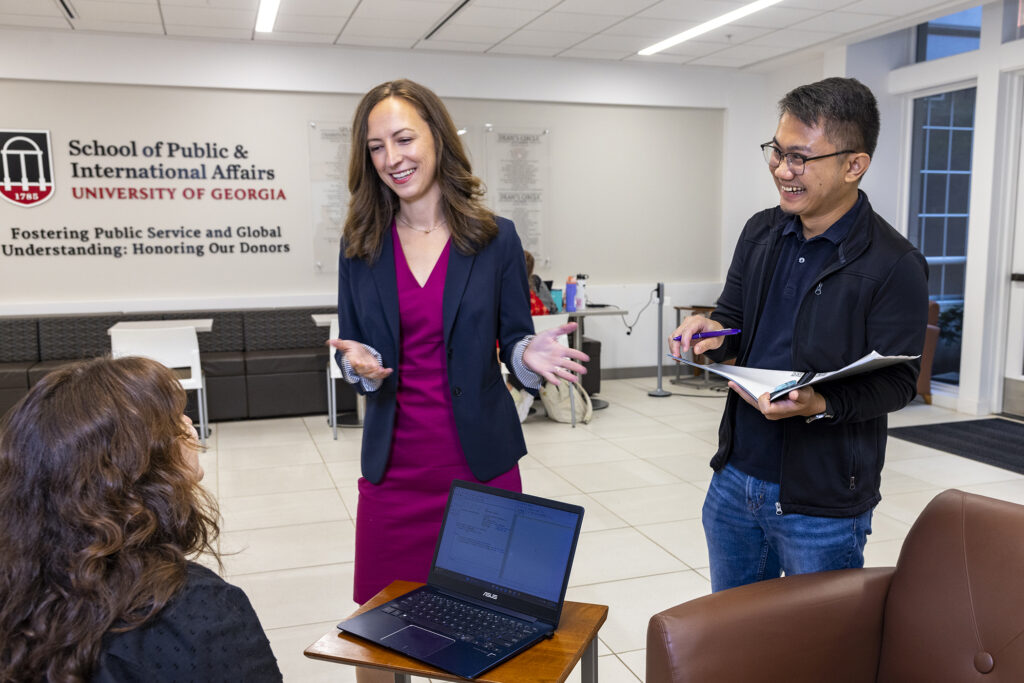As the daughter of two educators from Kentucky, Emily Lawler knew from a young age that she wanted to be a professor. When she embarked on her undergraduate studies at the University of Kentucky, her early interests led her from biology to engineering and back again. Her journey was far from linear, as she explored various majors before discovering her true calling: economics.
“I fell in love with the way economics combines human behavior with math modeling to understand decision-making,” said Lawler, an assistant professor in UGA’s School of Public and International Affairs.
Lawler entered her graduate studies at Vanderbilt University to become an economist, and by her second year, she found herself fascinated with health policy.
“I just got really excited about questions in health economics because they’re so policy relevant,” she said. “Their impacts are so clear.”
Lawler’s research is driven by a desire to address pressing issues in health economics. She delves into questions surrounding health policy and vaccination mandates, focusing on their impact on vaccine uptake and access to preventive care. Her work goes beyond correlational studies, aiming to provide evidence-based insights for policymakers.
“In my dissertation, we looked at school-based vaccine mandates as it applied to middle school students,” she said. “We’ve had policies like this in place since the smallpox vaccine in the 1800s, but they hadn’t really rigorously examined the impacts on vaccine uptake, and also the understanding of other consequences, intended or not.”
They found that for middle school students, mandating vaccines increased their contact with health care providers and thus their receipt of other recommended preventive care. This early research cemented her career in health policy and specifically pop culture, medical-related questions.
“I’m very motivated by questions I see raised in the media, and a lot of what we see is evidence from correlational studies,” she said. “I am interested in the causes as well as the additional consequences.”

Emily Lawler, center, talks with graduate students Victoria Bethel, left, and Miguel Estrada, right, at Baldwin Hall. (Photo by Dorothy Kozlowski/UGA)
After graduate school, Lawler made her way to the University of Georgia as an assistant professor of public policy in the department of public administration and policy. In the department, Lawler joined a host of public policy faculty members, who bring together an unmatched level of expertise in the health policy field.
“My colleagues are not just brilliant researchers and great scholars, they’re also so supportive of my work,” she said.
Mostly recently, Lawler published work that sheds light on the complex dynamics surrounding breastfeeding and its impact on mothers’ work lives. The study explored the consequences of state hospital regulations designed to encourage breastfeeding, revealing that such policies increased the likelihood of new mothers initiating and continuing breastfeeding. However, these positive outcomes came at a cost: mothers who opted for breastfeeding found themselves dedicating significantly more time to child care, often leading to reductions in their work hours, transitioning to part-time roles or leaving the workforce altogether.
This shift in labor force participation amounted to up to 3%, with a disproportionate burden on mothers. The findings underscore the importance of considering both the benefits and costs of breastfeeding promotion when shaping policies related to maternal employment.
Beyond her research, Lawler is deeply passionate about mentorship, especially for women in economics. She believes in equipping students with critical thinking skills and the ability to consider unintended consequences in policy decisions.
“I met Emily Lawler as an M.P.A. student, and she was immediately warm, inclusive and encouraging. She encouraged me to apply to the Ph.D. program, mentored me on research projects, helped me network and feel confident at conferences, was on my dissertation committee, and even continues to mentor me post-Ph.D.,” said former student Shelby Steuart. “Dr. Lawler cares deeply about her students and does everything she can to help them succeed while maintaining a rigorous, high-quality research portfolio. She’s a wonderful mentor, teacher and colleague.”
In her free time, Lawler enjoys playing tennis, hiking, exploring new restaurants and spending quality moments with her husband and their beloved dog, Blue. Her commitment to both her academic and personal pursuits exemplifies her holistic approach to life and her determination to make a meaningful impact on the world.








